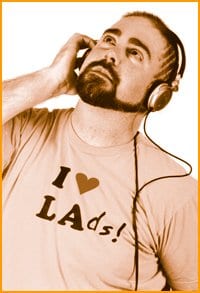Michael Venus: What did it take for you to become a disc jockey?
Dikodomy: Well, I guess the first thing that got me into being a DJ was love of the music. I think ever since I was in high school, I would listen to underground house music, watch Much Music’s Extenda-Mix, Electric Circus and followed the whole movement and fell in love with it. Then I befriended some DJs, like Quest. I would hang out at Celebrities and The Odyssey when he would play and really absorbed everything I could. I later met Leanne at The Rhythm Institute through taking a course and really enjoyed it. Then I started thinking that this may be something I would like to investigate, and ever since have just loved it!
MV: What do you think draws you to want to be a pied piper of sorts?
D: I think it’s being able to choose what people are going to love to dance to. You read the crowd (you obviously can’t bring all your records). So I pick one I feel they’ll like and if they don’t … shame on them (giggles for days)!
MV: And dance, goddammitt! Have you ever had any nightmare moments?
D: Yes, I think it was the first time I DJd, at what was the Milk Lounge. It was a Friday night and the pitch control was not working on the turntables, and I could not mix anything properly, so I just gave up and sort of played just one song after another. No-one was there anyway. There have also been a few train wrecks but those are expected.
MV: House music was underground for so long and then really overdone here in Vancouver. Some people would even say house is dead, like they said about disco (which is ridiculous-people always like to dance to good dance music! Hello!) Anyhow, where do you say it is? Is it dead? Where is it going?
I don’t think it’s dead and I really hope it never dies ‘cuz I love it so much. I definitely think it’s evolving, mutating and changing, which I think is a good thing. When you look back at house then, it still has some of the same elements that it used to have, but it has definitely changed drastically since.
MV: As most of us know, house music started in Chicago and New York in the gay clubs being worked friendly by those legendary queens. It has always been a part of gay underground and culture.
The diva vocals, the drama: why is it that the gays-well not just the gays, since I kinda think we’re more evolved anyway (we both knowingly giggle) No, but really, what is the fascination and why is it a part of our movement?
D: I think ever since disco in the ’70s, it’s been a place that brings people together to dance off some steam and enjoy themselves. Especially within the gay scene, it was one of the only places they could get a little crazy. It’s an escape of sorts, getting away from normalcy, letting go, drinks, pills for some.
MV: You also moonlight at the art gallery?
D: I have been with the gallery for over five years and work in the visitors service department, servicing all the visitors as they come in.
MV: I bet you do. But on a more serious note, I heard you truly do enjoy servicing men. Is that true or am I way off?
D: Could be true, depends on the man.
MV: To be completely honest I’ve heard you are an extremely hungry bottom?
D: Perhaps, also depends on the man (nervous giggles). My mother can’t read this!
MV: Okay, we’ll break on this for a bit while we get to know your other, let’s say, more feminine side.
D: Ever since doing an art-school project involving creating a person or an image of some sort-I was just coming out of the closet at that point and figured this would help me experience drag Drag queens to me at that point were symbolic, very out gay men, very visible in the community. So I started with a large collage of different drag queens and that led to three more years of school work both in critical studies and my disciplines in art (printmaking, photography and painting). I needed models so I thought I’d just do it myself. Needless to say the first few times were very tragic. I have since improved the make-up and costuming along with all the other lovely things. It’s really lots about the transformation and performance-it’s not about wanting to be a girl.
MV: I may be lying, but I think I also heard you love tucking?
D: Really like tucking? I have never tucked in my life! I am a non-tucking queen!
MV: We need a little background on you, so get blabbing!
D: Well, I came from my mummie’s womb, in Sydney, Australia. My mom was Canadian and my father was Australian. Mother got homesick and we returned to Vancouver where I continued my life. In Grade 12 I realized I didn’t have to be a doctor or a lawyer but that I could be an artist and go to school for that, which I did. I went to Emily Carr for the diploma program and then transferred over to the Emily Carr Institute of Art and Design for their fine-arts program, where I finished my degree.
MV: What turns your crank?
D: I like a very tall and burly man. Location is irrelevant-whatever or whereever-doing everything under the sun.
MV: Would two become one?
D: Probably.
MV: So would it be safe to say you’re a cub?
D: I pretty much identify as that.
MV: So you have a cubby hole! Any last words?
D: My mother can’t read this!

 Why you can trust Xtra
Why you can trust Xtra


